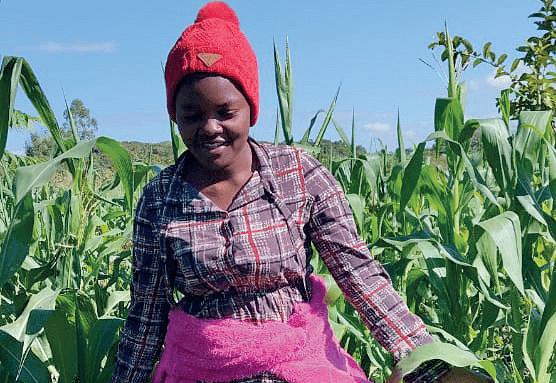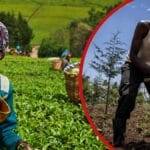Main Points In Hindi (मुख्य बातें – हिंदी में)
-
कैथरीन कुलिसेवा का संघर्ष: 26 वर्षीय कैथरीन ने कई छोटे व्यवसाय और सामान्य खेती के तरीकों के माध्यम से गुजारा करने की कोशिश की, लेकिन जलवायु परिवर्तन और पारंपरिक कृषि तरीकों के चलते फसल के नुकसान का सामना करना पड़ा।
-
बिग2प्रोजेक्ट में भागीदारी: वह बिग2प्रोजेक्ट में शामिल हुईं, जिसका उद्देश्य युवाओं को टिकाऊ कृषि तकनीकों में प्रशिक्षित करना है। इस परियोजना ने उनकी आजीविका और फसल की उपज में महत्वपूर्ण सुधार किया।
-
कृषि में क्रांति और सहयोग: परियोजना के तहत, कुलिसेवा ने आधुनिक सिंचाई, कीट प्रबंधन, और फसलों के अनुकूलन के तरीके सीखे। वह एक सहकारी संस्था का हिस्सा हैं, जहां 50 सदस्य कृषि संबंधी सुझाव और सहायता साझा करते हैं।
-
जलवायु संकट और नवीनतम प्रौद्योगिकी: जलवायु परिवर्तन ने उन्हें नवीन कृषि तकनीकों की आवश्यकता के प्रति जागृत किया। उन्होंने सूखा प्रतिरोधी बीज और अन्य आधुनिक तकनीकों का उपयोग करना सीखा है।
- युवाओं के लिए प्रेरणा और रोजगार के अवसर: उनके अनुभव और सफलताएं अन्य युवाओं को कृषि में शामिल होने के लिए प्रेरित कर रही हैं, जिससे नौकरी की संभावनाएं बढ़ रही हैं और मलावी के कृषि क्षेत्र का भविष्य बेहतर हो रहा है।
Main Points In English(मुख्य बातें – अंग्रेज़ी में)
Here are the main points from the provided text:
-
Challenges Faced by Farmers: Katherine Kuliseva, a 26-year-old environmental management graduate, struggled with small-scale businesses and farming due to crop losses caused by climate change and outdated farming practices.
-
Introduction to Sustainable Agriculture: Her participation in the Big2Project, launched in May, significantly improved her livelihood by providing training in sustainable farming techniques, allowing her to adapt crops to varying weather conditions and better manage irrigation.
-
Growth and Community Support: Kuliseva has transformed her farming operation in Mitundu, Lilongwe, growing diverse crops and increasing her income. She is now part of a cooperative with 50 members that share farming advice, enhancing the sense of community.
-
Youth Empowerment in Agriculture: The Big2Project not only promotes sustainable farming but also inspires young people to pursue agriculture, challenging the perception of farming as a last resort and contributing to addressing youth unemployment in Malawi.
- Financial Constraints and Calls for Support: While the Big2Project has trained over 1,000 young farmers, it is self-funded and faces limitations. Its founder urges government and private sector support for youth training and agricultural entrepreneurship, highlighting the need for financial assistance despite the initiative’s successes in fostering sustainable practices.


Complete News In Hindi(पूरी खबर – हिंदी में)
26 वर्षीय कैथरीन कुलिसेवा ने गुजारा करने के संघर्ष में कई छोटे पैमाने के व्यवसाय और सामान्य खेती की कोशिश की।
पर्यावरण प्रबंधन अध्ययन स्नातक ने जलवायु परिवर्तन और पुराने जमाने की खेती के तरीकों के कारण फसल के नुकसान का अनुभव किया।
हालाँकि, युवाओं को टिकाऊ कृषि तकनीकों में प्रशिक्षित करने के लिए मई में शुरू किए गए बिग2प्रोजेक्ट में शामिल होने के बाद उनकी आजीविका और उपज में सुधार हुआ।
इस पहल का उद्देश्य कृषि में क्रांति लाना और पर्यावरण की रक्षा करते हुए और जलवायु परिवर्तन से निपटते हुए किसानों को उनके छोटे भूखंडों से अधिक उपज लेने में मदद करना है।
कुलिसेवा उन अग्रणी किसानों में से थे जिन्होंने सरल सिंचाई, कीट और रोग प्रबंधन और विभिन्न मौसमों के अनुसार फसलों को कैसे अनुकूलित किया जाए सहित गुर सीखे।
वह कहती हैं, ”मैं उस ज्ञान के भंडार से प्रेरित हुई जिसे वे साझा करना चाहते थे।” “आधुनिक खेती के तरीकों ने नई संभावनाओं के प्रति मेरी आंखें खोल दीं।”
इसने बदल दिया कि कैसे युवा उद्यमी मितुंडु, लिलोंग्वे में अपना फार्म चलाती है, जहां वह टमाटर, प्याज, मक्का, आयरिश आलू, सब्जियां, शकरकंद और गन्ना उगाती है।
सिंचाई के साथ, वह साल में दो बार कुछ फसलें उगाती हैं।
“अब, मैं एक साथ विभिन्न फसलें उगा सकता हूं और कमाई बढ़ रही है। मैं पैसे बचाती हूं और अपने खेती के उद्यमों में दोबारा निवेश करती हूं,” वह बताती हैं।
वह देखती है कि उसकी आय अब शुरुआती निवेश से अधिक हो गई है, जिससे उसे बचत और कृषि उद्यम बढ़ाने में मदद मिली है।
इस परियोजना ने सामुदायिक समर्थन की उनकी भावना को भी गहरा कर दिया है।
वह एक बिग2प्रोजेक्ट सहकारी संस्था से संबंधित हैं जहां 50 सदस्य स्वतंत्र रूप से खेती संबंधी सुझाव और सहायता साझा करते हैं।
“मैं एक बड़े परिवार का हिस्सा हूं जहां मैं किसी भी समय मदद के लिए कॉल कर सकता हूं। इससे खेती में और अधिक करने का मेरा जुनून बढ़ता है,” कुसलीवा कहती हैं।
खेती के बारे में उनकी धारणा अपने परिवार का भरण-पोषण करने की लोकप्रिय खोज से कहीं आगे निकल गई है।
उनके लिए, यह व्यवसाय है जो बड़ा भुगतान करता है और उनकी खेती का फल कई युवाओं को इसे बूढ़े लोगों पर छोड़ने के बजाय किसान बनने के लिए आकर्षित कर रहा है।
जलवायु परिवर्तन ने उन्हें छोटे भूखंडों से अधिक लाभ प्राप्त करने के लिए नवीन तकनीकों की आवश्यकता के प्रति जागृत किया है।
वह कहती हैं, “जलवायु परिवर्तन वास्तविक है, लेकिन बिग2प्रोजेक्ट ने मुझे सिंचाई और सूखा प्रतिरोधी संकर बीज जैसी आधुनिक तकनीकें सिखाई हैं।”
कुलिसेवा अपने समुदाय को भोजन देने और युवाओं के लिए रोजगार पैदा करने वाले कृषि उद्यम की कल्पना करती है।
इस बात पर आम सहमति बन रही है कि मलावी 2063 एजेंडा के स्तंभों में से एक, वाणिज्यिक खेती पर स्विच करने से देश की बड़े पैमाने पर युवा बेरोजगारी को कम करने में मदद मिल सकती है। अंतर्राष्ट्रीय श्रम संगठन के अनुसार, देश के 18 से 30 वर्ष के युवा कार्यबल का एक चौथाई हिस्सा रोजगार की तलाश करता है, लेकिन उसे कोई नहीं मिल पाता है।
युवा किसानों का उद्भव उनके साथियों को प्रेरित कर रहा है और युवा लोगों के भविष्य को नया आकार दे रहा है, उन्हें कृषि में आगे बढ़ने के लिए सशक्त बना रहा है।
बिग2प्रोजेक्ट के संस्थापक ब्लेसिंग्स म्लेलेम्बा का कहना है कि यह पहल पूरी तरह से स्व-वित्त पोषित है, जो अधिक लोगों तक पहुंचने की इसकी क्षमता को सीमित करती है।
“युवाओं को आमतौर पर पाठ पूरा करने के बाद वित्तीय कठिनाइयों का सामना करना पड़ता है। दुर्भाग्य से, हम वित्तीय सहायता प्रदान नहीं कर सकते,” वह कहते हैं।
म्लेलेम्बा ने सरकार और निजी क्षेत्र से राष्ट्रीय कृषि विकास में योगदान देने वाले युवाओं के प्रशिक्षण और उद्यमों का समर्थन करने का आग्रह किया।
Big2Project व्यक्तिगत और ऑनलाइन प्रशिक्षण प्रदान करता है, जिससे दूरदराज के क्षेत्रों से भागीदारी की अनुमति मिलती है।
कुछ सत्र निःशुल्क हैं जबकि अन्य पर K5,000 पंजीकरण शुल्क लगता है।
इसने 750 युवा किसानों सहित 1,000 से अधिक लोगों को प्रशिक्षित किया है।
म्लेलेम्बा कहते हैं, “मुख्य फोकस टिकाऊ खेती और व्यावसायीकरण तकनीकों पर है।” “750 युवा प्रशिक्षुओं में से, लगभग 200 ने पहले ही देश भर में फार्म स्थापित कर लिए हैं।”
जैसे-जैसे कुलीसेवा जैसे लोगों ने उस क्षेत्र में पैठ बनाई है, जिस पर कभी बूढ़े लोगों का प्रभुत्व था, टिकाऊ खेती के तरीके न केवल युवाओं के लिए आर्थिक अवसर पैदा कर रहे हैं, बल्कि खाद्य सुरक्षा को भी बढ़ावा दे रहे हैं और मलावी में कृषि के भविष्य को आकार दे रहे हैं।
कृषि देश के 85 प्रतिशत से अधिक कार्यबल को रोजगार देती है, जो सकल घरेलू उत्पाद का लगभग 40 प्रतिशत और विदेशी मुद्रा आय का 83 प्रतिशत है।
Complete News In English(पूरी खबर – अंग्रेज़ी में)
Katherine Kuliseva, 26 years old, has faced struggles in making a living and has tried various small-scale businesses and general farming.
She holds a degree in Environmental Management and has experienced crop losses due to climate change and outdated farming methods.
However, her situation improved after joining the Big2Project in May, which trains young people in sustainable agricultural techniques.
This initiative aims to revolutionize agriculture, helping farmers increase their yields while protecting the environment and addressing climate change.
Kuliseva was among the pioneering farmers who learned valuable skills, such as simple irrigation and pest management, as well as how to adapt crops to different seasons.
She says, “I was inspired by the wealth of knowledge they wanted to share.” “Modern farming methods have opened my eyes to new possibilities.”
This knowledge transformed how she runs her farm in Mitundu, Lilongwe, where she grows tomatoes, onions, corn, Irish potatoes, vegetables, sweet potatoes, and sugarcane.
With irrigation, she is now able to cultivate some crops twice a year.
“Now, I can grow different crops together, and my income is increasing. I save money and reinvest in my farming ventures,” she explains.
She sees that her income has exceeded her initial investments, enabling her to save and expand her agricultural business.
The project has also deepened her sense of community support.
She is part of a Big2Project cooperative with 50 members who freely share farming tips and assistance.
“I feel like part of a big family where I can call for help anytime. This boosts my passion for farming,” Kuliseva says.
Her view of farming has expanded beyond just providing for her family; now, it’s a business that pays off, attracting many young people to become farmers instead of leaving it to the older generation.
Climate change has made her realize the need for innovative techniques to maximize profits from small plots of land.
She states, “Climate change is real, but the Big2Project has taught me modern techniques, like irrigation and drought-resistant hybrid seeds.”
Kuliseva envisions an agricultural business that feeds her community and creates jobs for young people.
There is a growing consensus that switching to commercial farming, one of the pillars of Malawi’s 2063 Agenda, could help reduce mass youth unemployment in the country. According to the International Labour Organization, a quarter of young people aged 18 to 30 in the country are looking for jobs but can’t find any.
The emergence of young farmers is inspiring their peers and reshaping the future for youth, empowering them to pursue agriculture.
Blessings Mlelemba, the founder of Big2Project, notes that this initiative is fully self-funded, which limits its capacity to reach more people.
“Young people typically face financial challenges after completing their training. Unfortunately, we cannot provide financial assistance,” he says.
Mlelemba urges the government and private sector to support training and enterprises for youth that contribute to national agricultural development.
Big2Project offers both in-person and online training, allowing participation from remote areas.
Some sessions are free, while others require a registration fee of K5,000.
The program has trained over 1,000 individuals, including 750 young farmers.
Mlelemba states, “The main focus is on sustainable farming and commercialization techniques.” “Of the 750 young trainees, nearly 200 have already established farms across the country.”
As people like Kuliseva make their mark in a field once dominated by the elderly, sustainable farming methods are not only creating economic opportunities for youth but also enhancing food security and shaping the future of agriculture in Malawi.
Agriculture employs over 85 percent of the workforce in the country, contributing nearly 40 percent of its Gross Domestic Product and 83 percent of foreign exchange earnings.




